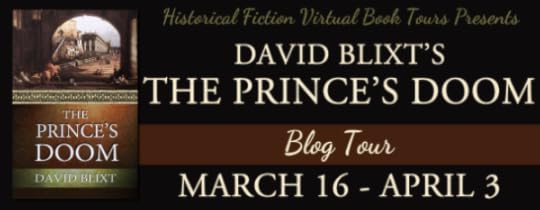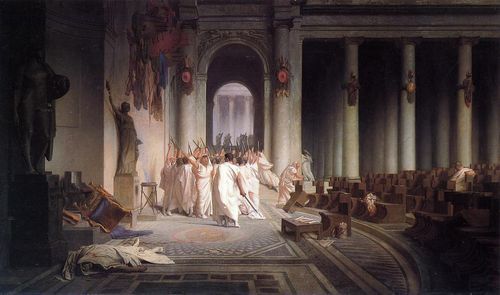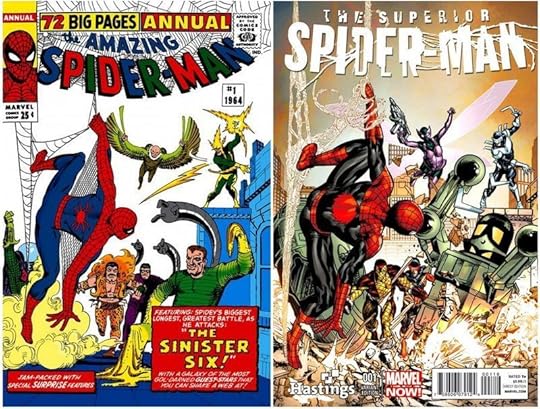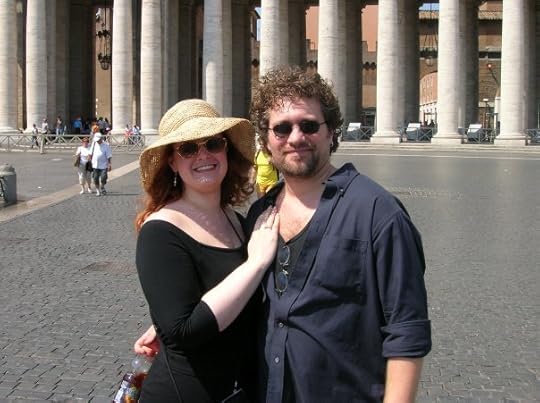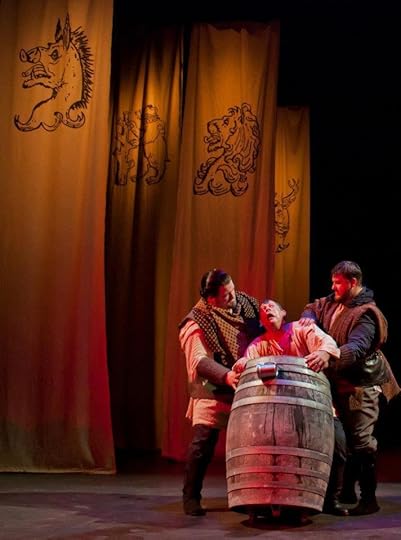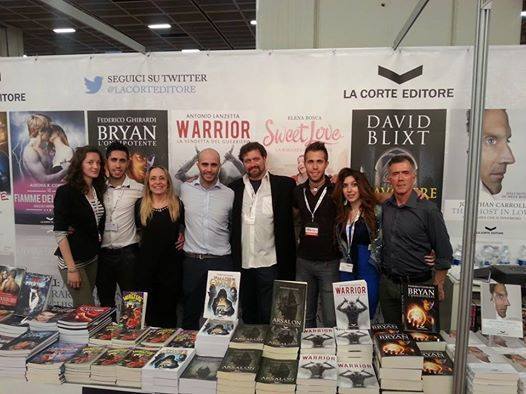David Blixt's Blog, page 6
March 16, 2015
Prince's Doom Blog Tour!
For the next several weeks I'm on tour with The Prince's Doom - virtually. Reviews, interviews, guest posts, and giveaways (yes, giveaways! Not just books, but swag!), all of it to promote my Doom!
Huge thanks to all the bloggers, and especially to Amy Bruno, who is the mastermind behind these tours. She's pretty fabulous, and a great lover of Historical Fiction.
So come along on my journey! It starts today!
The Prince’s Doom Blog Tour Schedule
Monday, March 16
Review at Book Nerd
Spotlight at What Is That Book About
Wednesday, March 18
Review, Guest Post, & Giveaway at With Her Nose Stuck in a Book
Spotlight at CelticLady’s Reviews
Thursday, March 19
Excerpt at Becky on Books
Friday, March 20
Excerpt at The Never-Ending Book
Saturday, March 21
Spotlight & Giveaway at So Many Precious Books, So Little Time
Monday, March 23
Review at Griperang’s Bookmarks
Tuesday, March 24
Guest Post & Giveaway at Griperang’s Bookmarks
Wednesday, March 25
Review at Svetlana’s Reads and Views
Spotlight & Giveaway at Let Them Read Books
Friday, March 27
Spotlight at Flashlight Commentary
Monday, March 30
Excerpt at Buried Under Books
Tuesday, March 31
Spotlight at A Book Geek
Wednesday, April 1
Excerpt & Giveaway at Peeking Between the Pages
Thursday, April 2
Review at Quirky Book Reviews
Guest Post at Books and Benches
Friday, April 3
Spotlight at A Literary Vacation
Guest Post & Giveaway at Historical Fiction Connection
March 15, 2015
Ides of March - Thoughts on Caesar and Brutus
Being in both historical fiction and classical theatre, I've naturally spent a great deal of time thinking about Julius Caesar. So it's no surprise that, of the many projects I've worked on, one of my proudest achievements is a play starring Caesar and Brutus on the night before the Ides. It's called EVE OF IDES, and is on sale this week on Kindle for just 99 cents.
Of course, my background is all Shakespearean, so my take on them is informed by Shakespeare's THE LIFE AND DEATH OF JULIUS CAESAR, a thoroughly deceptive title - the play has nothing to do with Caesar's life, and all to do with his death. For a title character he has very little stage time (just five scenes in all, I think, including his ghostly appearance) and is dead halfway through the play. The play belongs to Brutus.
But it's still all about Caesar.
It's taken me awhile to see that. As a huge fan of all things Roman, and a devotee of Colleen McCullough's marvelous MASTERS OF ROME novels, I love Caesar and I rail against the play because it doesn't do the man justice. Shakespeare portrays him as a self-important shell - deaf in one ear, prone to fits, suspicious, and constantly referring to himself in the third person. A formerly great man gone to seed, clinging to his reputation and dignity.
But the play is all about Caesar nevertheless. It's about the way the man's life, and especially death, changed the course of the world. Caesar permeates every scene, and Shakespeare assumes we'll get all the references - who doesn't know the story of Cato's suicide, or that Antony was jealous of Octavius for inheriting Caesar's wealth? It's our own fault that we don't pay attention to history anymore, and Shakespeare doesn't waste time telling us things we should already know. His focus is on the ramifications of the great man's death, and who better to be our guide than the man that murdered him?
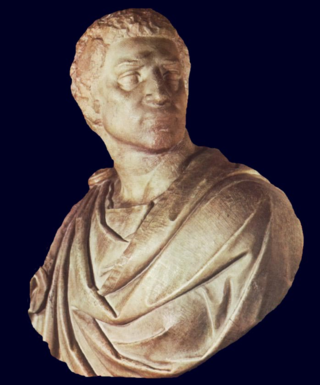 It's only recently that I've started thinking how very subversive the play's choice of protagonist is. For over 1600 years, Brutus was the villain. Dante puts him in Satan's mouth alongside Judas (and Cassius), the greatest betrayers of mankind being eternally devoured by the betrayer of God. Boccacio and Chaucer don't go quite so far, but they certainly exalt Caesar and condemn Brutus.
It's only recently that I've started thinking how very subversive the play's choice of protagonist is. For over 1600 years, Brutus was the villain. Dante puts him in Satan's mouth alongside Judas (and Cassius), the greatest betrayers of mankind being eternally devoured by the betrayer of God. Boccacio and Chaucer don't go quite so far, but they certainly exalt Caesar and condemn Brutus.
So Shakespeare takes the villain and makes him a hero. It reminds me of the modern play THE TRIAL OF JUDAS ISCARIOT, where they explore Judas' possible motives for betraying Christ. Shakespeare single-handedly rehabilitated Brutus, and despite Antony's rising sarcasm in his claim that "Brutus is an honorable man," Shakespeare's Brutus is just that.
The great flaw in Shakespeare's play, to me, is the lack of interaction between Caesar and Brutus. For men with such a tangled personal and political history, the play is remarkably silent regarding their past.
Oddly, Caesar's character is better explored through a different playwright - George Bernard Shaw. His CAESAR AND CLEOPATRA shows Caesar four years before the assassination, and while he complains of his age, Shaw presents an excellent version of the great man - his humor, his confidence, his arrogance, his wit, his philosophy, and his utter practicality. Also the fact that he was balding, and embarrassed by it, and that he didn't like rich foods or wine. But most of all, Shaw presents his clemency. In this play it's Caesar who is the dreamer, and like Brutus he is disappointed in everyone around him. But unlike Brutus, he is not disappointed in himself.
The relationship between Caesar and Cleopatra in the play is curiously platonic - very strange, considering she bore him a child and followed him to Rome to show the boy off.
Cogitating about Caesar, it's fast becoming my wish to find a theatre company somewhere and settle in to doing THE ROMANS, using the same cast to produce Shaw's CAESAR AND CLEOPATRA and Shakespeare's JULIUS CAESAR and ANTONY AND CLEOPATRA, with my own play stuck in the middle. I'm sure this idea isn't new - in 1951, for example, Olivier and Leigh played the leads in back-to-back productions of C&C and A&C (which must have been weird, I think, having him switch from Caesar to Antony). But I'd still like to try it, and use a year in the theatre to explore the fall of the Roman Republic and the rise of the Roman Empire.
An apt and timely subject, I think, looking at the world around us... America has always had Caesar on the brain. DC was originally named "New Rome" and they tried calling the Potomac the Tiber. There's even a place in the Senate building for the eternal flame of the Vestal Virgins (which they have since reconsidered and no longer keep lit).
At the Lincoln Memorial, Abraham Lincoln is seated in the pose of a Roman consul. And here's where the Caesar connection takes a strange turn. John Wilkes Booth was the son of noted British actor Junius Brutus Booth by his mistress. Booth himself debuted on stage in the role of Richmond in RICHARD III, the man who overthrows the tyrant Richard. He went on to play both William Wallace and Brutus himself. And of course, after he assassinated the president, Booth stole a line from the historical Brutus, one never mentioned in the play - "Sic Semper Tyrannis." It is also the motto of the stage of Virginia.
So happy Ides of March! Remember, it's not just about the murdering. It's the getting together with all your friends and murdering a tyrant.
February 27, 2015
Illegitimate
Okay, weighing in on the recent Giuliani kerfuffle, wherein America's Mayor questioned the President's patriotism and background. Yes, racist, absolutely. But it goes deeper than that, actually.
Republican talking heads cannot simply disagree with their opponents. They cannot just insult them or demonize them. They must delegitimize them. Voter fraud. Birth certificate. Unpatriotic. Benghazi couldn't just be a tragedy, it had to be a cover-up. Acorn. Communist. Socialist. Muslim. Foreign. Other.
But think back to when Bill Clinton was president. He wasn't one of us, either. Whitewater. Vince Foster. Lewinsky. Remember when the Right called Clinton "the first black president" as a way of de-legitimizing him? How about Kerry? Remember Swift Boats? Or flag pins - remember when suddenly everyone had to wear a flag pin or they didn't love their country? And if Hilary is elected, they're going to hit her with all the feminine bullshit, along with all her husband's baggage AND Obama's (Benghazi!). I guarantee Vince Foster's name will come up again, and stories about four dead bodies by train tracks or whatever the hell that nonsense was.
I'm trying to imagine a world in which every decision President Bush made was greeted by the media and protesters crying, "He's not REALLY the President! Hanging chads, hanging chads, voter fraud, stolen election!" or "Ohio voting machines! Stolen votes! Illegitimate!!!!" or "He rented that ranch in Texas! He's not a REAL American because he's faking his credentials as a rancher!"
It's gotten so bad on the Right that ANYTHING they disagree with can't be legitimate. Science isn't right anymore. Climate change must be a ploy by all those greedy scientists and, I guess, solar panel billionaires lining their pockets. Teachers aren't right, because we don't agree with the facts they're teaching. Now even history isn't legitimate!
Jon Stewart came close when he said they believe the opposite of bad isn't good, it's conservative. But I think it goes even further. The Right cannot even conceive of the other side playing fair, or having opinions that are honestly held, or being patriotic and yet thinking differently.
One of the worst ways to define yourself is in a negative. Through what you are not. But that's what happens when you're insecure in your beliefs. You find other people to point at and say, "I'm not like that!" So conservatives must demonize liberals in an effort to define themselves. It's not that they have firmly-held beliefs, as we learn every time the Left adopts a conservative idea and suddenly the GOP is against it. They simply know that whatever they are is right, and the other side is wrong. If the other side says one thing, the answer is always, "No!" It's a comforting formula, if incoherent. They can always know where they stand, because there will always be two sides - conservative and liberal. Or, put in their terms, the good people, and everyone else.
I believe that Republicans love America. But the GOP doesn't just want us to love America in the same way they do. They cannot conceive of anyone loving America in any other way, because that would mean there IS another way. And that would mean admitting there was legitimacy to an opposing point of view. Which they cannot do, because they are so insecure in their beliefs, they'll fight to the death to prove them true, against all odds.
Which is a shame, because that grit and determination could be really awesome, if it wasn't so rooted in fear.
February 10, 2015
Open Letter to Kevin Feige, Re: Spider-Man
Dear Kevin,
Hey, congrats. Nice deal. Well done.
I'm a big fan - both of you and of Marvel (though the Marvel fandom goes back a bit further). But you're doing awesome work, and I trust what you have in mind for Spidey 100%.
That said, I've long had an idea about comic-book films, Spider-Man in particular, and now is the moment. I think it will help you. Really, really help you. So I'm just gonna toss this out there:
Put a 2-3 minute Spider-Man adventure in front of every
Disney and Sony movie for the next two years.
I've always thought this would be a great way to drum up interest in these kinds of films. The hell with trailers. Make a 3 minute adventure that leaves us all wanting/demanding/ yearning for more.
The great thing about doing this now is that this would introduce us to your new Spidey, whomever he is, while at the same time not having to actually reboot him again.
As an added bonus, Spidey has a MASSIVE rogues gallery, some amazing, some goofy. Not all of them deserve a feature film, but we'd still love to see them on the screen. For instance:
The Shocker, in a heist interrupted - sweet.
The Beetle in an arial battle - totally awesome.
Kraven hunting Spidey through Central Park (setting up Last Hunt) - I am so on board.
The Chameleon, in a Spidey spy-story - rad.
Who else? The Prowler? I'd love that. Swarm? Scary, if weird. The Ringer? Okay, that might be too goofy. The Spot? Umm...
Well, you get the idea.
Seriously, you could do six of these short Spidey films, each with a different villain, and still have a ton left. We wouldn't need a backstory - just the fight, the jokes, the danger, and the awesome. And if one of them hit a nerve (like, say, Morbius the Living Vampire), you could develop that one into its own thing.
The joy of this would be taking care of all the world-building we'd need between now and Civil War to feel invested in the Spider-Man that resides in the Marvel Universe. And you know we'll all buy the DVDs, and download them on iTunes, and watch them over and over.
'Nuff said. I await my No-Prize.
Not Brand Ecch!
DB
(Thanks to Joseph Zettelmaier for listening to this idea and thinking it worthwhile. And for the record, I already have a No-Prize)
Relationships - The Two Questions
Today a teenager asked me for relationship advice. Awkward? Absolutely. I want to know nothing at all about teenage romances. I remember my own far too well.
Fortunately, I have a catch-all piece of relationship advice than Jan and I have relied on for years. Though it's not actually advice, I suppose. It's just two questions.
But they're good questions.
Now, we don't ever want to hear the answers, because the answers aren't for us. They're for the person trying to figure things out. But we've used these two questions with many friends, and those who are able to answer them honestly have had eye-opening moments, both good and bad.
The questions are these:
#1 - "Do you like this person?"
Not love, like. Love can ebb and flow. It can intoxicate and nauseate. Love is in motion, fluid, inconstant and inconsistent and powerful and awesome all at once.
But liking - that's a different matter. If you like someone, you're far more likely to forgive their faults, laugh at their jokes, and generally want to be around them. That's key to a healthy relationship.
#2 - "Do you like yourself when you're with this person?"
This is the crucial question. Are you the person you want to be when you are with this potential partner? Are you a version of you that you want to be for the rest of your life? Are you comfortable in your own skin around this other person?
So often attraction can make us do foolish, goofy, or outright stupid things. Like being in a relationship where we like the other person and end up hating ourselves. That's not sustainable, let alone healthy.
Everyone has days where they don't want to hang with themselves. But if you're in a relationship with someone who makes you feel that way all the time, that's not good for you. Or for the relationship. It might not even be them. It's about who you are when you're with that person.
Anyway, this is the advice I was able to trot out today. I was grateful, because it allowed me to avoid a deeper conversation. And the teen was grateful, because it's actually really solid advice.
Win-win.
(Jan and I outside St. Peter's in Rome in 2005 BC - Before Children)
February 4, 2015
Shock Therapy
It’s a big thing in entertainment to shock your audience. TV trolls us with teasers all the time: “You won’t believe the shocking twist!” “The last five minutes will shock you!”
There’s value in shock. It feels good, as an artist, to make people gasp and sit a little taller in their seats, or lean forward. I truly enjoy hearing from readers who want to curse at me for twists in my novels. It’s just as fun to have an audience leave the theatre complaining or arguing about how they’re shocked. It’s one of the things I admire about Bob Falls at the Goodman – his ability to shock. I remember watching the final moments of his Measure For Measure a couple years back and laughing myself sick at the stunned gasps around me.
But the best thing about Bob’s use of shock and awe is his restraint. He is judicial. He knows that not every play he directs needs a “shocking” moment. He knows too that to have a proper shock, the audience first needs to be invested in the story and the characters. Without that, the shock is meaningless.
It’s a lesson that needs to be learned by more and more directors and writers, across the spectrum of entertainment. If your concept is a shocking moment, shelve the project until you have a story to go with it.
Let’s call this M. Night Shyamalan Syndrome – when you build your story around a “surprise”, whether it’s surprising or not. He had so much success with The Sixth Sense, and again with my favorite of his films, Unbreakable, for their great twists at the end, it became his party trick. It became a marketing ploy, a tool. But if you tell me I’m going to be surprised, how can it still be a surprise? If everything you do is try to shock me, then all I’m doing is trying to figure out what the shock is going to be. And I stop following the story.
Worse, once you’ve established your need to shock, you’ve got to top yourself. And there’s only so far you can go before you enter the realm of self-parody.
It should be no surprise that the best surprises come out of the story, out of characters we’re invested in. The Red Wedding is a fantastic example. The Crying Game. My god, the end of A Pawn In Frankincense. All of these work because the story isn’t depending on them as a crutch. Rather, they’re the payoff to our investment. They’re not a gimmick, or a replacement for real storytelling.
This goes for “shocking” concepts, too. Don’t aim to hit me with a stunning hammer, don’t beat me over the head with a message in your choice of setting for a classic show. If you’re doing Shakespeare, choose a setting that comes out of the text, and doesn’t change the nature of the play, but rather illuminates it.
Which brings us back to Do. In this case, Do focus on the story. Don’t focus on the shock. If you want to make your audience squirm or jolt in their seats, earn it. Or else the shock is all they’ll remember.
Shocks just aren’t shocking any more. What’s shocking today is a well-told story.
(Photo from the Michigan Shakespeare Festival's 2012 production of Richard III, directed by Janice L Blixt. Visit www.michiganshakespearefestival.com for more information)
Follow David on Facebook here.
February 2, 2015
The Best Question
In my post last week about the passing of Colleen McCullough, I mentioned that when I met her I wasted my one question. It was at a book signing. She was promoting her book Morgan's Run, and I asked an historical quibble about prisoners and New South Wales v. the British army. She thought I was questioning her research and got shirty. Which was the absolute last thing I wanted.
What I should have asked, what I always tell people to ask their favorite authors, is this:
"Who do you read?"
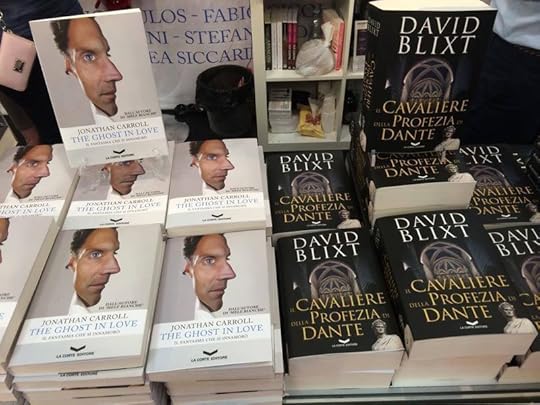 Last year, at the Torino Book Fair with La Corte Editore (my Italian publisher), I spent a great deal of time trying to sell books. Not just my books, though I'd certainly talk about them if asked. No, I was thrilled because sitting beside mine was Jonathan Carroll's latest. I love his writing, and made no bones that day about saying so. It didn't hurt me in the slightest, and it helped my publisher. Rising tide.
Last year, at the Torino Book Fair with La Corte Editore (my Italian publisher), I spent a great deal of time trying to sell books. Not just my books, though I'd certainly talk about them if asked. No, I was thrilled because sitting beside mine was Jonathan Carroll's latest. I love his writing, and made no bones that day about saying so. It didn't hurt me in the slightest, and it helped my publisher. Rising tide.
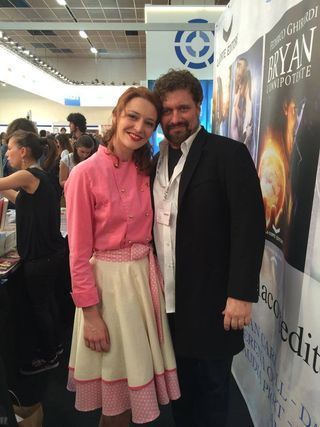 Carroll wasn't there that day, but several others were, and everyone was doing the same thing. Antonio Lanzetta would jump in and shill for my book, while Fabio Cicolani would promote Antonio's, with Elena Wendy Bosca swooping in and charming everyone into - well, into buying her books, because that smile! - but everyone else's too. And if a kid came by, we would load that kid down with Fabio's books.
Carroll wasn't there that day, but several others were, and everyone was doing the same thing. Antonio Lanzetta would jump in and shill for my book, while Fabio Cicolani would promote Antonio's, with Elena Wendy Bosca swooping in and charming everyone into - well, into buying her books, because that smile! - but everyone else's too. And if a kid came by, we would load that kid down with Fabio's books.
As a writer, the best thing I can do is advise people to read authors other than me. I want them to trust my opinion, and I want to pay it forward.
It's the same in theatre. Last year I sent several reluctant theatre-goers to see Lifeline Theatre's Killer Angels. I'm talking about people who refused to believe theatre had anything to offer them. Those people are now devoted Lifeline subscribers. I am going to drag everyone I know to see The Hypocrites remount of All Our Tragic next summer.
I have nothing to do with those shows. I gain nothing, personally. But it not only fosters good art - it fosters trust. That when I say something is good, I'm not talking out of my ass. I mean it's good, and worth reading or seeing.
So next time you're talking to an actor, an author, a director - ask them what they recommend. It'll tell you a lot.
February 1, 2015
The Business of Art
This has been a fun couple of days. Thanks to everyone who has shared my burblings on Art and Competition (special shout-outs to Molly Brennan, Rick Sordelet, Steve Pickering, and American Theatre Magazine). The flood of affirmation has been lovely. Evidently I hit a rich vein.
Naturally there have been naysayers (surprisingly few, actually). I've chosen not to engage them, because it's like working the refs. I know directors who respond publicly to negative reviews, when they'd be better off letting their work speak for itself. And God help the author who dares to comment on a negative review. No, better to simply appreciate everyone's participation and then move on.
However, mine was a persuasion piece, which invites dialogue. Which I'm delighted to have. My trouble has been that for the most part there's been very little to say. Those who disagree have either been shouted down by others, or just snarked and ran.
But there was one fellow who had something concrete to say. He referred to my piece as "high minded and noble, yet in the end quite naive", informing me that Theatre is a BUSINESS (emphasis his).
As if I needed to be told.
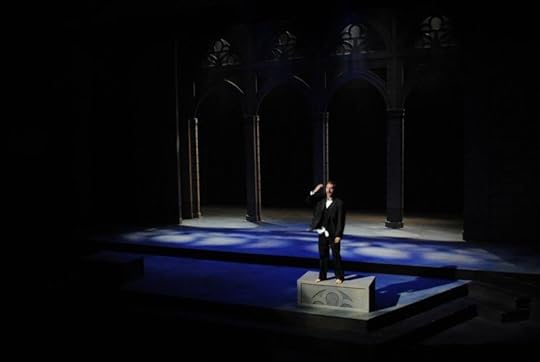 I happen to be married to the Artistic Director of two successful theatre companies, one union, one not, located in two different communities. So I am intimately aware of what it feels like to not get a grant, or to create budgets, or to forgo a paycheck so those in your employ can get paid, or even see other theatres counter-programming your same shows a few months earlier to try and hurt your audience.
I happen to be married to the Artistic Director of two successful theatre companies, one union, one not, located in two different communities. So I am intimately aware of what it feels like to not get a grant, or to create budgets, or to forgo a paycheck so those in your employ can get paid, or even see other theatres counter-programming your same shows a few months earlier to try and hurt your audience.
Yes, theatre is a business. But it's NOT a competition. It's not like selling paper towel, where if I make Bounty, I want people to buy mine, not Scott or Brawny, and especially not those bastards at Viva (kidding, love Viva). That's a business where if they win, I lose.
Theatre artists are not selling a physical product. We're selling art. It's harder to quantify, so let's look at it another way. Let's play numbers.
Say you run a successful theatre company. You have an 8 show season. Let's say your shows are so awesomely awesome that all of your patrons see each show twice. Well done!
Now, what are those patrons going to do for the other 349 days in the year?
Let's go further. Let's say those patrons only go to theatre on weekends. That's 140 days without shows to see. Or maybe they just go on Saturday nights. There are 52 Saturdays in a year. Assuming they're still seeing all your shows twice, what are they going to do the other 36 Saturday nights a year?
Taking it even further, we can agree that times are tough lately. Theatre can be expensive. So they only go out every other Saturday night in the year. If they see all of your shows twice (because they are full of delicious awesomesauce), they still have 10 nights a year in which to see theatre other than yours.
Life is not a zero sum game. And neither is theatre. Not unless you make it that way.
And here's a secret - it's good BUSINESS to support other theatres in your area. If you foster an appreciation of theatre, you create more theatre-goers. More theatre-goers, more profit for theatres. More profit, more shows. More shows, more employment for artists. More employment for artists, the larger the talent pool. Which leads to more choices for theatres, who can then produce better shows. And the cycle begins again.
Again, a thriving theatre community is good for BUSINESS. Not just the theatres themselves, but for restaurants and bars and hotels and everyone else in the area. We should all be working to build an appreciation for what theatre brings to a community.
The flip side of this is artists whose goal is to "take-down" the competition, to make themselves look good by comparison. I once worked with an actress who literally upstaged me in all of our scenes. As in, contrary to our blocking, she took a step upstage in performance so I would have to turn my back on the audience to address her. Rather than play her game, I turned and played my scenes out to the audience. I don't engage in that noise. And she ended up having to come downstage to play the scene.
Whatever you expect, you tend to get more of. If you expect courtesy, you will get more of it. If you offer respect, you'll get respect in return. If you offer betrayal, you will get more of that too.
This is true for more than just performers. There are theatres I've worked at that pay well, but I don't like being there. I can feel the bad vibes in the walls the moment I step inside. The environment is toxic, rife with grudges, envy, and insecurity. Especially insecurity, which is the hobgoblin of the artistic life - it poisons everything. We're all insecure. When we're all doing jobs that last at most three months at a time, our lives are the very definition of insecure. We lack security.
There are some people who hate seeming insecure, lest people find out they are in fact insecure and accuse them of not knowing what they're doing (Fraud! Charlatan! Mountebank!). This insecurity builds up in their minds, vibrating through their very beings, until they resort to projecting certainty. More than that, Absolute Certainty.
Now, that's not the same as confidence. Confidence is great, it's quiet, almost serene. Confidence is someone with a clear vision. There might be stumbles or slight alterations, but if the vision is clear, things tend to be relaxed.
Absolute Certainty is desperate, it claws at your nerves. And it's infectious. If you model rigid Absolute Certainty, you stop everyone around you from asking questions. And, dear lord, is there nothing more important in the creative process than asking questions? Even worse, you stop others from having ideas, because they know their contributions will not be welcome.
This is as true of directors as actors. I've honestly never understood directors who do not like ideas from the actors. If it's a bad idea, don't use it. If it's a good idea, who gets the credit? The director. It's a no-lose situation. Yet there are so many directors who are threatened by actors voicing opinions (as an opinionated actor, I've stepped in it more than once. But as a director, I adore actor ideas. It only makes me look better).
On the other hand, there are performers and theatres that freely admit their insecurity. They just acknowledge it and move on with what they're doing. If we're good at what we do, and we all bring our best, we'll figure it out. These are the places I most enjoy working - where it's not about the people, but the work. Because, yes, theatre is a BUSINESS. And in the BUSINESS of theatre, what matters isn't egos, or turf. It's the work. The product. The actual show.
Which brings us to another trend today - running a theatre like a business (sorry, I'm getting tired of all-caps). This trend is getting a lot of lip-service, it's a buzzy phrase. All over the place we're seeing the elimination of the Artistic Director and Managing Director positions in favor of Executive Directors, whose mandate is to run the theatre like a business.
It hasn't gone well.
Good business sense is important. Budgets and taxes and publicity and payroll and grants and donors and rentals and everything else. There is nothing so valuable as a good Managing Director, as well as Development Directors, Marketing Directors, and everyone else that makes a theatre run.
A business, however, needs to have a quality product. If I'm selling paper-towel, I want to make sure my paper-towels are the best I can produce. If I'm selling widgets, I should listen to the widget-designer.
And if I'm in the business of selling theatre, I should be listening to the people who make it.
Yes, stay within budget. Yes, manage the business-side well. But if your product is Art, you should probably be listening to the artists.
And stop thinking about other theatres as the competition. They're not the enemy. Poor quality is the enemy. Lack of interest is the enemy. Apathy is the enemy.
Good art begets more art. And that's good for business.
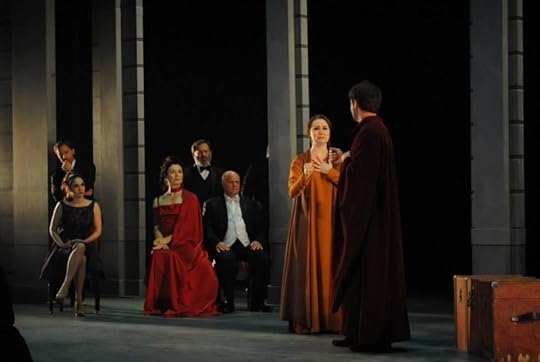 (Photos from the Michigan Shakespeare Festival's 2014 production of Hamlet, directed by Janice L Blixt.Visit www.michiganshakespearefestival.com for more information)
(Photos from the Michigan Shakespeare Festival's 2014 production of Hamlet, directed by Janice L Blixt.Visit www.michiganshakespearefestival.com for more information)
Follow David on Facebook here.
January 30, 2015
On The Shoulders Of Giants
“Writing is easy. You only need to stare at a piece of blank paper until your forehead bleeds.” – Douglas Adams
When I set out to write “Her Majesty’s Will,” I was scared. Why? Because I wasn’t going to be able to rely on my usual bag of tricks. I was setting out to do something I’d never tried before. I was going to write a Comedy.
Now technically, Comedy doesn’t mean funny. In the loosest sense, it means it has a happy ending – Shakespeare always ends his Comedies with a marriage, sometimes accompanied by a song. Aristotle tells us that Tragedy is about grand things and noble people, while Comedy is about small things and ignoble people (Mel Brooks says that Comedy is about Tragic things happening to other people).
But today if you say you’re writing a Comedy, everyone expects to laugh. And when I first came up with the notion of filling in the gap of Shakespeare’s ‘Lost Years’ by making him a hapless spy, I knew I couldn’t treat it as one of my ‘serious’ novels. It was a silly idea, and had acknowledge that fact. It had to be funny.
The problem with that is, simply, I’m not funny. I’m in theatre, so I know some insanely talented funny people, and that’s not me. I have a very dry sense of humor, and I loathe most sit-coms and any movie that relies on embarrassment for a laugh. I like (some) buddy comedies, (most) screwball comedies, and anything full of wit (hello, Douglas Adams and Eddie Izzard) or ribald badinage (hello, Shakespeare and Aristophanes).
So when it came time to be funny, I went to the well of my favorite humorists to figure out the elements of what I like in a Comedy.
Not to learn.
To steal.
“Mediocre writers borrow. Great writers steal.” – T. S. Eliot
Naturally, any Comedy about William Shakespeare has to employ Shakespeare’s own comedic devices – cross-dressing, mistaken identities, disguises, musicians, mis-timings, clowns, bawds, and big reveals (if I could have added a ship-wreck, I would have!). The Bard thus gave me a mental check-list to cover. A good start. Besides, Shakespeare stole the plot for every story he ever wrote. So he couldn’t judge me for thieving.
That raised the issue of a plot. But in perfect truth, I didn’t really care about the plot. Not this time. I simply looked at a list of events during the years before Shakespeare appeared in London, and right there was the Babington Plot. Elizabeth, Mary, Walsingham, Catholics, spies, and a beer barrel? Sold!
I also knew right off the bat that this was a buddy comedy, teaming Will Shakespeare with the wily, mercurial Kit Marlowe (who really was a spy). At once I recalled my favorite books in that vein, the Myth Adventures series by Robert Asprin. I actually knew Bob back when I was a kid, and to this day I love the adventures of Aahz and Skeeve.
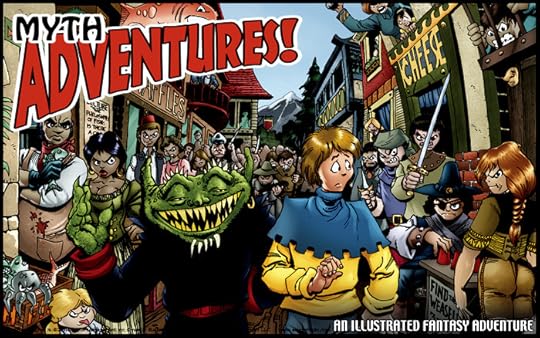
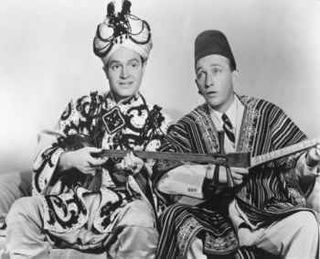 Of course, those books are Bob’s own homage to the Road Movies of Hope and Crosby. So the book became a Road Movie. That gave me the framework. Watching those films, I love how Hope and Crosby are always undermining the other, and through their self-interest they create their own perils. Every decision they make to save themselves only gets them in deeper. In their self-assurance and arrogance, they were their own worst enemies.
Of course, those books are Bob’s own homage to the Road Movies of Hope and Crosby. So the book became a Road Movie. That gave me the framework. Watching those films, I love how Hope and Crosby are always undermining the other, and through their self-interest they create their own perils. Every decision they make to save themselves only gets them in deeper. In their self-assurance and arrogance, they were their own worst enemies.
Where had I seen that before?
“Comedy is unusual people in real situations; farce is real people in unusual situations.” – C. M. Jones
Before Shakespeare, before Aristotle, before Bob Asprin, Eddie Izzard, or Douglas Adams, I learned Comedy from one source, and one source only: Charles M. Jones.
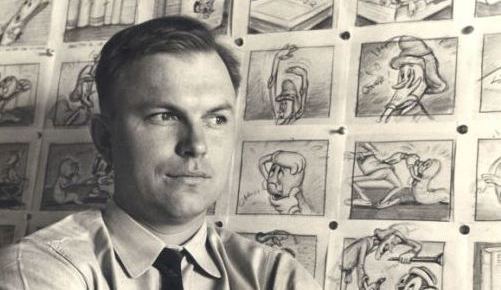
It mortifies me to think that there might be people alive in the world who do not know his name. But all one has to do is start singing “Kill the Wabbit, Kill the Wabbit!” and everyone smiles and nods. Yeah. That’s him. One of Bugs Bunny’s creators, the inventor of Road Runner, Coyote, and Pepe le Pew, and the re-inventor of Daffy Duck. The man who gave the Grinch his Grinchy smile. That’s Chuck Jones.
Chuck had his own inspirations – Charlie Chaplin, H. L. Mencken, and Mark Twain. You can see his comic timing and commentary on humanity come from them. In marvelous, 6-minute snippets, he distilled them into pure comedic gold. I’ve watched all of Chuck’s cartoons, from his early attempts to be as cute as Disney through him slowly finding his voice to the height of his career, when he crafted the best comedic moments of the 20th Century. Because Chuck understood that comedic heroes never go looking for trouble, just react when it arrives. Moreover, he created the best buddy comedy team of all time in his pairing of Bugs and Daffy. The one is who we want to be, and the other is who we are. Or as film teacher Richard Thompson once said, “Bugs talks, and Daffy talks too much.”
Why hello, Will. Hello there, Kit.
“Writing is easy. All you have to do is cross out the wrong words.” – M. Twain
So – theme, tricks, frame, ‘plot,’ all complete. All that was lacking was the Voice.
More than any other kind of story, Comedy has a voice. On stage or in film, it’s often a literal voice, with a character looking at or talking directly to the audience. But sometimes it’s the frame of the shot, the juxtaposition of lines and action, or simply lingering an extra beat to watch a comedian react. Chuck called it a Motivated Camera, and the motivation is sharing something with the audience. Like laughter itself, Comedy is best when it’s shared.
It’s always hard to pull off. But in novels, it becomes even trickier. The true master of this was Douglas Adams, who never hesitated to use his narrative voice to be absurd and wonderful. Knowing that I am certainly no Douglas Adams, I found myself thinking, of all people, of Charles Dickens. Because while he was never absurd, he also didn’t stint from commenting upon his characters: “Oh! But he was a tight-fisted hand at the grindstone, Scrooge! a squeezing, wrenching, grasping, scraping, clutching, covetous old sinner!” Imagine the shock and sneers if some modern author described a character in such a way. But it’s a tradition stretching proudly back from Homer to story-tellers around campfires to minstrels and bards – the active voice of the narrator. Also wonderfully used in the Goofy cartoons of the early 1940s (watch “How To Ski”), as well as top and bottom of Chuck’s forgotten classic “Fin’n Catty.” So I decided to employ that same voice – arch, but never winking, and never afraid to comment on the action or the people.
Thus I was ready. Armed with the best elements of my favorite Comedies, I jumped in.
Then stopped.
Because it wasn’t funny.
“The secret to humor is surprise.” Aristotle
I was daunted. Oh, the tone was right, and the action was fine. But there was one element that I had entirely neglected, a key ingredient, the je ne sais quoi, an X-factor that kept it from singing, kept it from leaping off the page, kept it from making me want to keep writing.
So I put the story in a drawer for a couple years. I knew what I wanted, but I decided I just wasn’t funny enough to pull it off. Maybe I’d grow funnier with age – though it hadn’t happened so far.
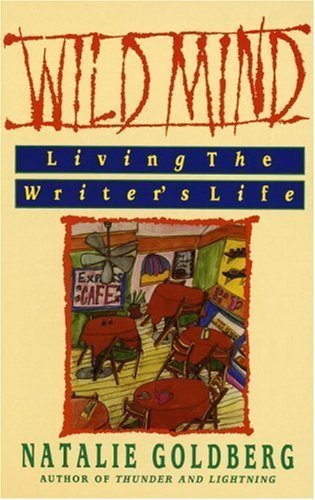 There’s a great chapter in Natalie Goldberg’s “Wild Mind” where she talks about the perils of wanting something too much. That’s happened to me in lots of auditions. I want it too badly, so I blow the audition. Whereas if I’m relaxed, if I’m myself, that’s when I tend to get cast. It’s a truth I’ve known since I was 19, but like all truths in my life, it’s one I have to keep relearning.
There’s a great chapter in Natalie Goldberg’s “Wild Mind” where she talks about the perils of wanting something too much. That’s happened to me in lots of auditions. I want it too badly, so I blow the audition. Whereas if I’m relaxed, if I’m myself, that’s when I tend to get cast. It’s a truth I’ve known since I was 19, but like all truths in my life, it’s one I have to keep relearning.
Here’s another truth, one I also forget to my peril – the answer is always in the research. That’s where inspiration lies.
In the case of this novel, the answer was in Stephen Greenblatt’s marvelous “Will In The World,” a book not strictly about Shakespeare himself, but about the world he inhabited, extrapolating out small details from what little we know and putting them all firmly in context. It is a treasure on its own, but to me, it gave me the thing I’d been lacking, the true key to crafting the story I wanted.
I had forgotten that, more than anything else, all great Comedy has to have heart.
“Comedy is defiance. It’s a snort of contempt in the face of fear and anxiety. And it’s the laughter that allows hope to creep back on the inhale.” – Will Durst
A comic hero rises from pathos, from a desire to be understood. He also owns strong indignation at injustice. It was something Chuck knew, and wrote about frequently: “Like all heroes and heroines, Bugs Bunny grew strong when strong villains began confronting him… Bugs never engages with an opponent without reason. He is a rebel with a cause.”
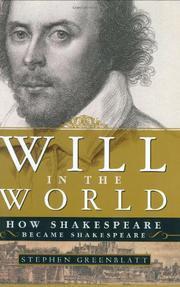 In Greenblatt’s book, I saw glimpses of a potential comic hero in Will: a brilliant, frustrated, eager, disappointed, gullible, cynical, empathetic, cutting, witty, and humble young man. I know Shakespeare from his plays. But by putting him firmly in his world, he became more human. He became the mass of contradictions that we all are, that Comedy seeks to exploit. He became that rebel with a cause. With something to say.
In Greenblatt’s book, I saw glimpses of a potential comic hero in Will: a brilliant, frustrated, eager, disappointed, gullible, cynical, empathetic, cutting, witty, and humble young man. I know Shakespeare from his plays. But by putting him firmly in his world, he became more human. He became the mass of contradictions that we all are, that Comedy seeks to exploit. He became that rebel with a cause. With something to say.
Then there’s this, too: “Bugs emerges into the battle zone as a sort of cross between Groucho Marx, Dorothy Parker, James Bond, and Errol Flynn. Bugs loves the thrill of the chase. Once engaged, he is the most enthusiastic of participants: saucy, impudent, and very quick with words in circumstances that would confound most of us.” Ah, yes. That’s my man.
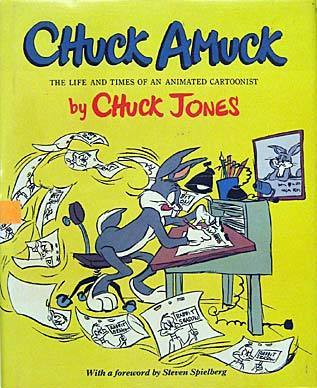 And Kit? Again Chuck writes: “Bugs succeeds because he is successful, but Daffy needs great determination in the fight to win the recognition he knows he deserves… A public loss of dignity will all but destroy him. The more you know Daffy, the better you like him, because you are going to recognize yourself.”
And Kit? Again Chuck writes: “Bugs succeeds because he is successful, but Daffy needs great determination in the fight to win the recognition he knows he deserves… A public loss of dignity will all but destroy him. The more you know Daffy, the better you like him, because you are going to recognize yourself.”
The secret to Comedy is humanity. If Tragedy is about rising above our frailties and foibles to be our best selves, Comedy exploits those frailties and foibles, but never maliciously. Lovingly. With empathy.
“Life is a tragedy when seen in close-up, but a comedy in long-shot.” – Charlie Chaplin
So when I finally sat down to write Her Majesty’s Will, it practically wrote itself. Standing on the shoulders of comedic giants – Twain, Mencken, Chaplin, Hope and Crosby, Adams, Asprin, Jones, and Shakespeare himself – they all reminded me that Comedy is all about us getting a happy ending we probably don’t deserve. Will gets better than he deserves in this novel. Kit absolutely gets better than he deserves. And this book turned out far better than I ever deserved.
The best part was that I was smiling the whole time I wrote it.
(One last Chuck quote: “The rules are simple. Take your work, but never yourself, seriously.” Amen, brother)
January 29, 2015
Master of Rome
Today I am broken-hearted. Colleen McCullough has died.
I throw a lot of love and attention towards Dorothy Dunnett, and often tell people that she's the pinnacle of the genre. But Colleen is probably the author who most changed my life. It is safe to say that huge swaths of my present existence would simply not be here without her influence.
I discovered historical fiction through listening to the audiobook of THE FIRST MAN IN ROME on a road trip with my dad when I was 18. I was very "you've got to be kidding me, dad," but he insisted, and within minutes I was absolutely enthralled. She made me love history, Rome, and the genre all at once. She even made me regret dropping Latin in high school, and forced me to go back to supplement my meager rememberings. She gave me a sense of American history, through the eyes of Rome - our Founding Fathers were obsessed with Rome, and the Republican model. But most of all she made me see what could happen if you take real people and just write. Her Caesar is flesh and blood. Her Marius is so utterly tragic and brilliant, even at the end. And her Sulla - my god, I love her Sulla.
When discussing our favorite Romans, someone once remarked that I loved the butchers. I suppose that's true. Because she made me love them.
Her MASTERS OF ROME books are a touchstone for me. I return to them often, they on a shelf just behind my head. I even got to meet her a dozen years ago. I wasted my question, and now I'll never get to ask the one I should have, which is "Who do you read?"
If Dunnett amazes me for her plots, her words, and her twists, McCullough amazes me with her detail, her research, and her willingness to tell everyone's story. And her sex. My god, her sex scenes! I'm a fade-to-black kinda guy, and Colleen makes me sweat.
It's safe to say that both EVE OF IDES and the COLOSSUS series would not exist without her influence. And just last week I bought a new copy of SONG OF TROY to reread.
Today the world is a little less perfect. Caesar would disapprove.
To steal from two of her funeral orations - Caesar's for Julia, and Sulla's for his son:
"I say to you, people of Rome, mourn for her! Mourn her as I do! Mourn for her fate and for the sadness of an undeservedly sad life. Rome will be the poorer, as I and all my family are the poorer. We bury her now with great love and greater sorrow, and offer you gladiators for her funeral games."

